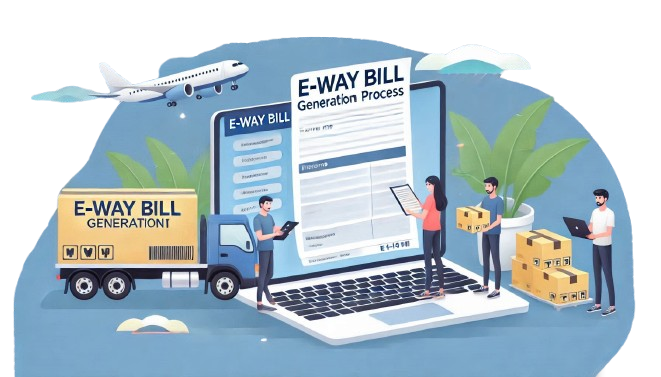A Complete Guide of E-Way Bill Generation Process
E-Way Bill is the most critical component of GST in India, which is designed for streamlining and tracking the movement of goods. It is a procedure that has to be done by a business owner or transporter or supplier to carry out their goods across one state to another.
This guide outlines, step by step, the process of an E-Way Bill, its applicability, and answers to frequently asked questions so that you can easily tread this crucial GST requirement.
What is an E-Way Bill?
An E-Way Bill is an electronic bill needed for the transportation of goods whose value exceeds ₹50,000. The same is mandatory under the GST regime for monitoring the goods in transit and complying with tax.
Objective of E-Way Bill
E-Way Bill Application
When an E-Way Bill is Compulsory
The value of any transported commodities is more than Rs 50,000/
Goods are being sent to a different state and transported within the same state/
Job work, selling or returning/
Import/Export Goods
When an E-Way Bill is not Essential
How to Create an E-Way Bill
Creating an E-Way Bill is simple enough, through the E-Way Bill Portal.
Login to E-Way Bill Portal
Open ewaybillgst.gov.in. login using the same or proceed with sign up
Generate New
Once on the home page of the EWB Portal select the 'Generate New'
Add details
Invoicing details along with the GSTIN of supplier/recipient, HSN code, quantity/value of goods, etc.All vehicle number or transporter IDs associated with the transportation process.
Authenticate details
Make sure all entered data are accurate so that error should not occur.
Generate an E-Way Bill
Press "Submit" in the menu to generate EWB. The E-way Bill will have a uniquely allotted EBN.
Print/DOWnload the EWBS
Save the E-way Bill as PDF for ease in sharing and verification.
E-Way Bill Generation for Specific Cases
Purchase Returns
Update Part A with return invoice details.
Ensure the transporter provides accurate vehicle details for return trips.
Unregistered Buyers
Use the buyer's PAN or address details in Part A.
Specify "URP" (Unregistered Person) in the GSTIN field.
E-Way Bill Rules and Compliance
Important Rules to Remember
Validity
For up to 100 km: 1 day.
For every 100 km beyond: +1 day.
Amendments
Only Part B, transport details, can be amended after generating.
Cancellation
Can be cancelled within 24 hours if goods not transported.
Penalties for Non-Compliance
Fine is equal to tax amount or ₹10,000 whichever is higher
Seizure or detention of goods and vehicles.
Advantages of E-Way Bill
Simplified Goods Movement
It cuts down waiting time at tolls and ensures faster delivery.
Enhanced Tax Compliance
Reduces tax evasion through automatic tracking.
Supply Chain Transparency
Increases visibility into goods movement for all involved parties.
Lighter Administrative Burden
Less paperwork and manual errors due to automation.
Ease of Integration with Billing and Accounting Software
The modern-day tools like Sleek Bill simplify the generation of the E-Way Bill because they integrate billing, inventory, and tax compliance in one platform.
Invoicing details are automatically filled to generate the E-Way Bill faster.
Real-time updates about the validity of the same.
Easy Integration with ERP systems.
The E-Way Bill generation process is a critical aspect of GST compliance, ensuring transparency and efficiency in goods transportation. By understanding its rules and leveraging automation tools, businesses can streamline their logistics, avoid penalties, and focus on growth.
If you’re looking for a hassle-free solution, integrate your billing system with E-Way Bill generation software like Sleek Bill for seamless compliance and improved operational efficiency.












 GST Invoice Format
GST Invoice Format
 GST Billing Benefits
GST Billing Benefits






 Free training & support
Free training & support 60K Happy Customers Worldwide
60K Happy Customers Worldwide Serious about
Serious about